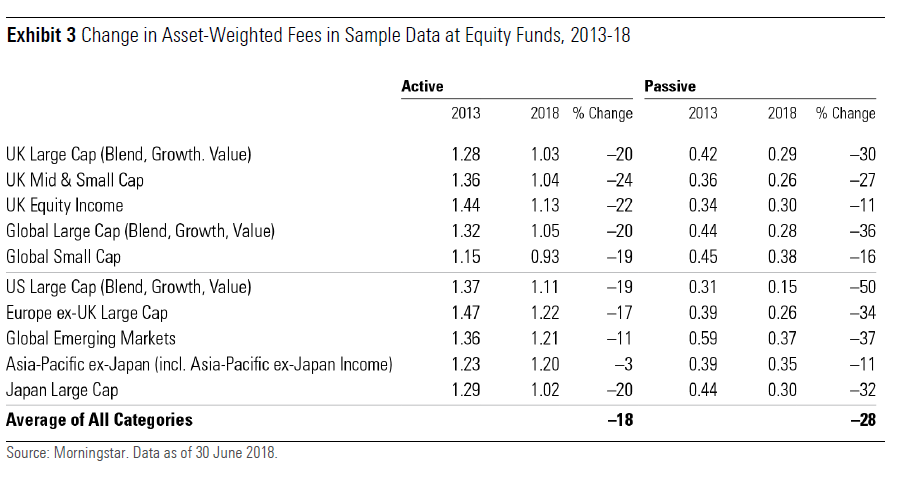Active funds fail to keep pace with passive fee cost cuts
Despite the steady downward trend in active fees, passive investment funds have cut fees much more aggr…
25th October 2018 14:45
by Tom Bailey from interactive investor
Share on
Despite the steady downward trend in active fees, passive investment funds have cut fees much more aggressively, with average fees being cut by 28% over the same time period.

Despite active managed equity funds seeing their fees fall by around 20% over the past five years, they have failed to keep pace with the rate of the fall in passive investment fund fees: with index funds and exchange-traded funds (ETFs) cutting their charges by 28%.
According to research by Morningstar, in a paper titled ‘The Effects of the Retail Distribution Review on Fund Fees in the UK’, since 2013 fees for active equity funds were cut by an average of 18%, on an asset-weighted basis.
Driving this fall in active fees, says Morningstar, was the Retail Distribution Review (RDR), introduced in 2013.
By requiring investment funds to provide greater disclosure on fund fees, the full cost in fees paid by investors has become clearer. The increased transparency stoked some competition between fund providers and greater price discrimination from investors.
- Three model investment portfolios for a retirement nest egg
As Morningstar notes: “There is no doubt that the RDR has influenced the marketplace, in a good way. There is greater transparency of fees for the investor, and this has brought to the fore the issue of the assessment of value at a fund level.”
Investors in large-cap equity funds saw some of the greatest savings, with both the US and UK large-cap equity categories have seen an average 20% reduction in fees since the RDR. As a general rule of thumb equity funds, regardless of size or style, tend to display an ongoing charge figure ranging between 0.85 per cent and 1 per cent.
However, despite the steady downward trend in active fees, passive investment funds (ETFs and index tracking funds) have cut fees much more aggressively, with average fees being cut by 28% over the same time period.

Passive investment has seen intense competition on fees, with Fidelity recently taking the lead by offering investors on its US platform access to two index trackers with zero fees.
At the same time, large-cap funds, despite seeing the largest fee reductions among active funds, also failed to keep pace with fee reduction for passive large-cap strategies. UK large-cap passive funds cut fees by an average of 30%, while US large-cap cap passive funds slashed fees by a whopping 50%. As Morningstar notes: “Clearly, cheap can get cheaper.”
However, when it came to fixed-income funds, fees for active have fallen faster. The average fee for actively managed bond funds fell by 10%. In contrast, the average passive bond fund fee has only come down by 4%.
- Active funds have underperformed passive in all but two sector
This article was originally published in our sister magazine Money Observer, which ceased publication in August 2020.
These articles are provided for information purposes only. Occasionally, an opinion about whether to buy or sell a specific investment may be provided by third parties. The content is not intended to be a personal recommendation to buy or sell any financial instrument or product, or to adopt any investment strategy as it is not provided based on an assessment of your investing knowledge and experience, your financial situation or your investment objectives. The value of your investments, and the income derived from them, may go down as well as up. You may not get back all the money that you invest. The investments referred to in this article may not be suitable for all investors, and if in doubt, an investor should seek advice from a qualified investment adviser.
Full performance can be found on the company or index summary page on the interactive investor website. Simply click on the company's or index name highlighted in the article.